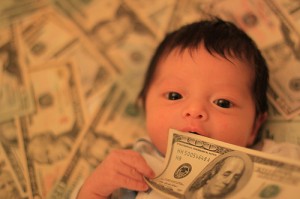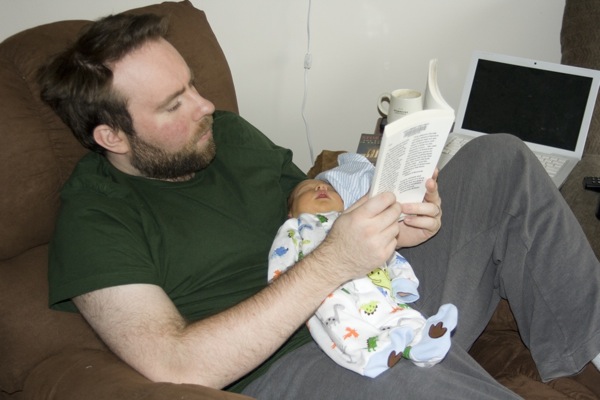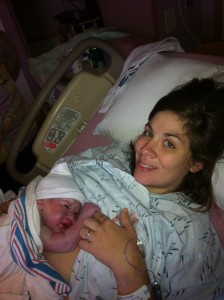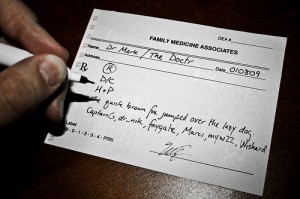 Throughout my pregnancy, everyone who gave me advice agreed on a lot of things. I’d love the baby instantly. He’d grow too fast. He’d be worth all of the discomfort of pregnancy. (They were all right.)
Throughout my pregnancy, everyone who gave me advice agreed on a lot of things. I’d love the baby instantly. He’d grow too fast. He’d be worth all of the discomfort of pregnancy. (They were all right.)
There was one thing they couldn’t agree on, though. Half of them said to prepare myself because babies are SO expensive. The other half told me babies don’t cost much at all.
I was really curious to see who was right. Two months into parenthood, and I can see where the disagreement comes from. The answer: it depends.
Baby expenses begin long before the baby is born. We needed a car seat, somewhere for baby to sleep (we chose a bassinet for the first few weeks and a crib for later), clothes for the baby to wear, and diapers for the baby to, well, you know. The rest of the baby stuff is optional, but nice to have.
While it’s possible to buy secondhand, shop around for deals, or accept hand-me-downs (we did all three of those things), the truth is that the initial startup costs for baby can be steep. Thankfully, we have a huge support group of family and friends who gifted us with everything we needed.
Once the baby’s born, formula can be one of the biggest monthly expenses. If your baby doesn’t have special dietary concerns, off-brand formulas can provide the same nutrition for a fraction of the price. The cheapest option is breastfeeding (it’s basically free if you do it exclusively), and I’m incredibly grateful that it’s working out well for us so we can avoid the expense of formula.
Diapers are another huge monthly expense. Newborns use 8-12 diapers a day, so the costs really do add up. Buying diapers on deep discount and using coupons can cut the cost tremendously. So can cloth diapering. By hunting for deals, buying seconds (slightly imperfect but new diapers), and sticking with the economical prefolds and covers system of cloth diapering, I built a stash that will last throughout my baby’s diapering years for under $300. That works out to about $10 a month if the baby spends 2 and a half years in diapers. That number drops even lower if you use your diapers for a second or third child.
Our generous friends and family provided us with enough new clothing and hand-me-downs from Judah’s cousins to keep him clothed for the next year. He has enough outfits in each size that I can get away with doing just one load of his laundry every week. He wears the same things all the time, but that’s okay with me. When he grows out of the clothes we have for him, we can shop garage sales, thrift stores, and clearance racks to keep clothing costs down. Until he’s old enough to complain about it, he’ll be wearing the same handful of outfits every week.
These are just the expenses that you can control, though. The biggest expense for us (and one that we unfortunately can’t do anything about) is health insurance. When my husband and I were both covered by individual policies, the cost to add our son was going to be astronomical — $400 a month added to the $500 we were already paying to insure the two of us. My husband’s new job offers family insurance for about half that, which is a relief. But our health care costs are much higher as a family of three than they were as a family of two.
Later we’ll see changes in our food costs as Judah starts eating solid foods. There will also be education expenses and recreational costs as he gets older.
These expenses that you can’t control are the reason why it’s so important to save money on the expenses that you can control. Cutting costs where ever you can will make it easier to afford the expenses you can’t change.
My point is this: if you’re pregnant or want to get pregnant, how expensive (or inexpensive) your baby will be is entirely up to you. Like so many other expenses, the choices you make will affect your budget. If you buy everything brand new, pay full price for diapers and formula, and fill your baby’s closet with more clothing than he needs, the costs can be astronomical. But with a little careful planning and frugal know-how, your baby’s first year doesn’t have to affect your monthly budget that much at all.






